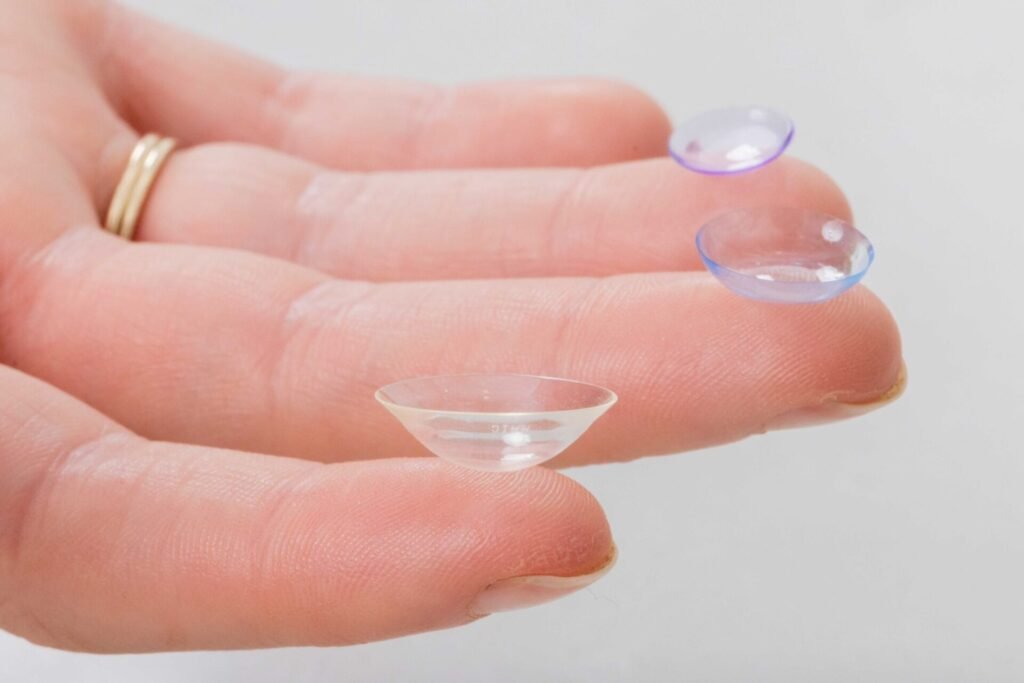Contact lenses are a good choice if you want a natural appearance or lead an active lifestyle. They can also correct certain eye conditions, including keratoconus. Speak to an eye doctor for help determining the right lenses for your condition and comfort.
Here are a few frequently asked questions about rigid contact lenses:
What Makes Rigid Contact Lenses Different?
Rigid contact lenses, also called rigid gas permeable (RGP) lenses, are small and firm. Made from special polymers that allow oxygen to reach the eye, they maintain their shape on the cornea, providing sharper vision for people with astigmatism or irregular corneas. Soft lenses are usually larger and absorb water, making them more flexible. Your eye doctor may also recommend hybrid lenses, which feature an RGP center and a softer outer skirt. Since rigid lenses are gas-permeable and don’t absorb water, they help reduce bacterial buildup. The lenses feel slightly rigid at first, but most people adapt to wearing them within a few days or weeks.
Who Should Wear Rigid Contact Lenses?
| Condition / Need | Explanation | Why Rigid Lenses Help |
|---|
| High Astigmatism | Cornea shaped like a football rather than round | Rigid lenses create a smooth surface, correcting uneven light refraction |
| Keratoconus | Cornea progressively thins and bulges into a cone-like shape | Provides stable vision by masking the irregular corneal surface |
| Irregular Corneal Shapes | May result from injury, surgery, or natural variation | Rigid surface neutralizes irregularities for clearer vision |
| Durability Needs | Soft lenses tear easily and need frequent replacement | Rigid lenses resist tearing and can last for years with proper care |
| Hygiene & Maintenance | Proper cleaning required to prevent infections | With good hygiene, lenses remain safe, effective, and long-lasting |
How Do Rigid Contact Lenses Work?
Rigid contact lenses keep their shape, which creates a smooth, even surface over the eye. Soft lenses usually mold directly to the shape of the cornea. Rigid lenses maintain their shape over the tear film covering the eye. The gap between the lens and cornea fills with tears, smoothing out irregularities and improving vision clarity.

With the corneal irregularities masked, light enters the eye more evenly, resulting in sharper, clearer vision. Doctors may customize the lens based on the shape and size of your cornea and the underlying eye condition. Some designs, such as scleral lenses, are made specifically for keratoconus, dry eyes, and botched laser surgery. Because of their smoothing effect, rigid contacts can be more effective for corneal irregularities than soft lenses and eyeglasses.
What Are the Care Requirements?
Because rigid contact lenses are worn for several months, they require proper daily care and maintenance. You must clean and disinfect the lenses daily using recommended solutions, as regular cleaning protects the lenses from protein deposits and other buildup that may lead to discomfort or bacterial growth. A clean lens also reduces the risk of irritation and infection.
| Guideline | Details |
|---|---|
| Usage | Intended for daytime wear to optimize vision |
| Before Bed | Remove lenses and store as instructed by your doctor |
| Sleeping in Lenses | Avoid, as it reduces oxygen supply and increases risk of complications |
| Lens Care | Inspect regularly for damage |
Safety Tips Collins Eye Center
If you want your hard contact lenses to last as long as they should, it’s important to take good care of them. Taking care of your lenses will also lower the risk of an eye infection or scratches on your cornea.

- Daily cleaning. Daily cleaning of hard contact lenses is essential. It’s important to clean your contact lens case every day, too
- Don’t use tap water. The germs in tap water can stick to contact lenses. Instead, use cleaning solutions that are specially formulated for hard contact lenses.
- Use precautions when swimming or bathing. Because tap water can increase the risk of an eye infection, try to avoid wearing your contact lenses while swimming or bathing. Or, you can wear swimming goggles that keep the water from coming into contact with your lenses.
- Replace contact lens case regularly. Even though your hard contact lenses may last for several years, your lens case should be replaced every few months to avoid contamination with germs that can cause eye infections.
- Avoid saliva. Never clean your contact lenses with saliva. Your saliva contains bacteria that may harm your eyes.
- Clean your hands. Make sure your hands are clean every time you touch your contact lenses. Wash them thoroughly before putting your contact lenses into your eye or removing them.
- Don’t sleep in your lenses. This can increase your risk of getting an eye infection.
Speak to an Eye Doctor Today
Before recommending lenses, doctors perform a contact lens exam. The evaluation assesses your eyes’ overall health and may involve measuring the curvature of your cornea. Each lens is customized, so there’s no one-size-fits-all solution. Contact an eye doctor today to find out more about their lens options and services.

